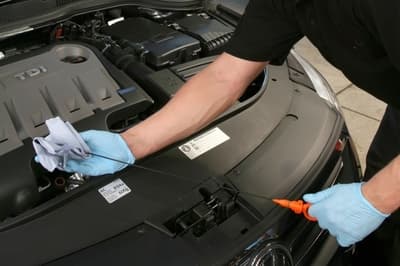How to check your oil
Engine oil is often described as the lifeblood of your vehicle’s engine. The oil cleans and lubricates many parts to help keep your vehicle’s engine healthy and running smoothly and it is important to know how to check this.
We recommend that you check car oil at least once a month to prevent damage to engine components and to reduce the risk of breaking down.
Checking car oil
Checking car oil is very simple to do and can be done at home. Firstly, allow your engine to cool for a least ten minutes and make sure it is parked on an even level to get an accurate oil reading.

Simply open and secure your bonnet and have a cloth (lint-free) or some kitchen roll to hand. The oil dipstick should be quite easy to find, it usually has a yellow or orange pull ring at the top, similar to the image above.
When you have located the dipstick, pull the dipstick fully out and make sure to wipe all the oil from the dipstick with a cloth or piece of kitchen roll, so that you can see the oil level indicators, then put the dipstick back in fully for a minute and remove again. You should now be able to see the oil level on the dipstick. If the oil level is between the min and max indicators your oil level is satisfactory. If the oil level is below the min level, you will need to top up urgently, but make sure you top up with the correct oil for your vehicle, as there are different types.
What are the different types of oil?
There are three different types of oil Conventional, Synthetic Blend and Fully Synthetic
Conventional oil is the most common type and is suitable for light-duty and older vehicles and it is categorised into different grades based on quality and viscosity. This type of oil is cheaper and has basic lubrication qualities, but performs well at high temperatures.
Synthetic blend oil is a blend of conventional oil and premium synthetic oil. This is very popular amongst motorists because it is cost effective and the synthetic content has many benefits, including increased oil life, resistance to oxidation, better durability and can withstand higher and lower temperatures.
Fully synthetic oil is a premium oil used in high-performance vehicles, to maximise engine performance, it has higher viscosity levels, increased lubrication, resistance to oxidation and oil sludge, and improved fuel efficiency.
What happens if I overfill my oil?
Overfilling your oil can cause damage to your engine, the excessive oil increases pressure and can come in to contact with the crankshaft, causing the oil to change consistency which reduces lubrication to essential engine components. Pressure in the engine could also cause excess oil to escape through seals and gaskets and could cause these parts to fail, which can be costly to repair.
How do I know when to change my oil?
Oil can become contaminated, dirty or sometimes smells of fuel. If you notice any of these changes it’s time to change your oil.
If you notice dirty smoke coming out of your exhaust, this is a sign that your oil is losing its lubricating abilities and you should change your oil as soon as possible.
You may also get a warning light on your dashboard indicating your oil level is low or needs changing.
Related: Dashboard Warning Lights
How often should I change my oil?
The benefits of changing your oil and oil filter are abundant, firstly it keeps your engine clean, improves performance and saves on fuel.
Older vehicles need to have more frequent oil changes to keep older parts cool and lubricated and we recommend you change the oil after every 3,000 miles, especially if your vehicle is older than 2007. It is also recommended that the oil filter is changed at the same time, as it can get clogged up with debris and dirt.
Newer synthetic oils have much better lubricating qualities and durability and it is recommended to change this type of oil every 7,500 miles.
Related: Book an oil change
Car Servicing
Our car servicing plans include an oil and filter change, whether that is an interim, intermediate or full service and we recommend that you service your vehicle every year or 12,000 miles.
Regular services have many benefits, including better road handling, increased fuel efficiency, smoother ride and reduces the risk of breaking down.
Related: Book a car service
Does my oil level get checked on an MOT check?
Not essentially, but the MOT testing station will not be able to do an exhaust emissions test if the oil level is low and this could result in an MOT failure. So, make sure to check this before your MOT is due.
Related: When is my MOT due?
We hope this information is helpful, but if you need further assistance our branch technicians will be happy to help. We have over 235 National Tyres and Autocare branches throughout the UK.
Did you enjoy this blog post? |


 Sign up for SPECIAL OFFERS
Sign up for SPECIAL OFFERS
